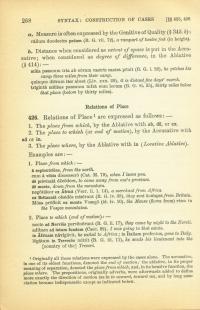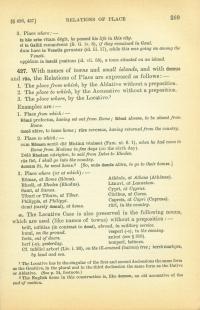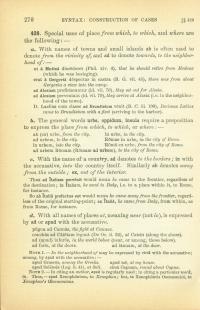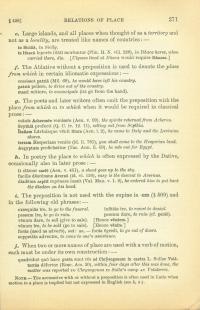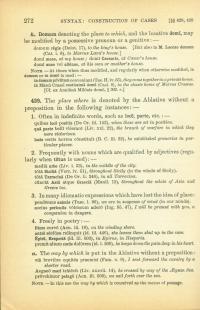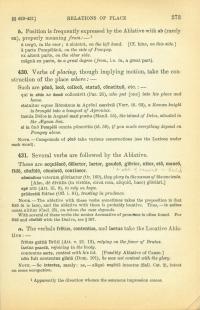426. Relations of Place1 are expressed as follows.
- The place from which, by the ablative with ab, dē, or ex.
- The place to which (or end of motion), by the accusative with ad or in.
- The place where, by the ablative with in (locative ablative).
Examples are:
-
Place from which.
ā septentriōne
from the northcum ā vōbīs discesserō (Cat. M. 79)
when I leave youdē prōvinciā dēcēdere
to come away from one's provincedē monte
down from the mountainnegōtiātor ex Āfricā (Verr. 2.1.14)
a merchant from AfricaEx Britanniā obsidēs mīsērunt. (B. G. 4.38)
They sent hostages from Britain.Mōsa prōfluit ex monte Vosegō. (id. 4.10)
The Meuse (flows from) rises in the Vosges mountains. -
Place to which (end of motion).
Nocte ad Nerviōs pervēnērunt. (B. G. 2.17)
They came by night to the Nervii.Adībam ad istum fundum. (Caec. 82)
I was going to that estate.In Āfricam nāvigāvit.
He sailed to Africa.in Ītaliam profectus
gone to Italylēgātum in Treverōs mittit (B. G. 3.11)
He sends his lieutenant into the [country of the] Treveri. -
Place where.
In hāc urbe vītam dēgit.
He passed his life in this city.sī in Galliā remanērent (B. G. 4.8)
if they remained in Gauldum haec in Venetīs geruntur (id. 3.17)
while this was going on among the Venetioppidum in īnsulā positum (id. 7.58)
a town situated on an island
427. With names of towns and small islands, and with domus and rūs, the Relations of Place are expressed as follows.
- The place from which, by the ablative without a preposition.
- The place to which, by the accusative without a preposition.
- The place where, by the locative.2
Examples are:
-
Place from which.
Rōmā profectus
having set out from RomeRōmā abesse
to be absent from Romedomō abīre
to leave homerūre reversus
having returned from the country -
cum Rōmam sextō diē Mutinā vēnisset (Fam. 11.6.1)
when he had come to Rome from Modena in five days
(on the sixth day)Dēlō Rhodum nāvigāre
to sail from Delos to RhodesRūs ībō.
I shall go into the country.Domum iit
He went home.3suās domōs abīre
to go to their homes -
Place where (or at which).
Rōmae at Rome
(Rōma)Athēnīs at Athens
(Athēnae)Rhodī at Rhodes
(Rhodus)Lānuvī at Lanuvium
Samī at Samos
Cyprī at Cyprus
Tīburī or Tībure at Tibur
Cūribus at Cures
Philippīs at Philippi
Capreīs at Capri
(Capreae)domī at home
(rarely domuī)rūrī in the country
a. The locative case is also preserved in the following nouns, which are used (like names of towns) without a preposition:
|
bellī mīlitiae abroad in military service |
|
|
humī on the ground |
vesperī (-e) in the evening |
|
forīs out of doors |
animī (see § 358) |
|
herī (-e) yesterday |
temperī betimes |
Cf. īnfēlīcī arborī (Liv. 1.26)
on the ill-omened (barren) tree
terrā marīque
by land and sea
428. Special uses of place from which, to which, and where are the following.
a. With names of towns and small islands ab is often used to denote from the vicinity of, and ad to denote towards, to the neighborhood of.
ut ā Mutinā discēderet (Phil. 14.4)
that he should retire from Modena (which he was besieging)
Erat ā Gergoviā dēspectus in castra. (B. G. 7.45)
There was from about Gergovia a view into the camp.
Ad Alesiam proficīscuntur. (id. 7.76)
They set out for Alesia.
Ad Alesiam perveniunt. (id. 7.79)
They arrive at Alesia.
(i.e. in the neighborhood of the town)
D. Laelius cum classe ad Brundisium vēnit. (B. C. 3.100)
Decimus Lœlius came to Brundisium with a fleet.
(arriving in the harbor)
b. The general words urbs, oppidum, īnsula require a preposition to express the place from which, to which, or where.
|
ab (ex) urbe from the city |
in urbe in the city |
|
ad urbem to the city |
Rōmae in urbe in the city of Rome |
|
in urbem into the city |
Rōmā ex urbe from the city of Rome |
|
ad urbem Rōmam (Rōmam ad urbem) to the city of Rome |
|
c. With the name of a country, ad denotes to the borders; in with the accusative, into the country itself. Similarly ab denotes away from the outside; ex, out of the interior.
Thus ad Ītaliam pervēnit would mean she came to the frontier, regardless of the destination; in Ītaliam She went to Italy, i.e. to a place within it, to Rome, for instance.
So ab Ītaliā profectus est would mean he came away from the frontier, regardless of the original starting-point; ex Ītaliā he came from Italy, from within, as from Rome, for instance.
d. With all names of places at, meaning near (not in), is expressed by ad or apud with the accusative.
|
pūgna ad Cannās the fight at Cannae |
|
|
conchās ad Câiētam legunt (De Or. 2.22) at Caieta (along the shore) |
|
|
ad (apud) īnferōs in the world below (near, or among, those below). |
|
|
ad forīs at the doors |
ad iānuam at the door |
Note 1— In the neighborhood of may be expressed by circā with the accusative; among, by apud with the accusative.
|
apud Graecōs among the Greeks |
apud mē at my house |
|
apud Solēnsīs (Leg. 2.41) at Soli |
circā Capuam round about Capua |
Note 2— In citing an author, apud is regularly used; in citing a particular work, in. Thus, apud Xenophōntem (in Xenophon) but, in Xenophōntis Oeconomicō (in Xenophon's Œconomicus).
e. Large islands, and all places when thought of as a territory and not as a locality, are treated like names of countries.
in Siciliā
in Sicily
In Ithacā leporēs illātī moriuntur. (Plin. H. N. 8.226)
In Ithaca hares, when carried there, die.
[Ulysses lived at Ithaca would require Ithacae]
f. The ablative without a preposition is used to denote the place from which in certain idiomatic expressions.
Cessisset patriā. (Mil. 68)
He would have left his country.
patriā pellere
to drive out of the country
manū mittere
to emancipate
(let go from the hand)
g. The poets and later writers often omit the preposition with the place from which or to which when it would be required in classical prose.
mānīs Acheronte remissōs. (Aen. 5.99)
the spirits returned from Acheron
Scythiā profectī (Q. C. 4.12.11)
setting out from Scythia
Ītaliam . . . Lāvīniaque vēnit lītora. (Aen. 1.2)
He came to Italy and the Lavinian shores.
terram Hesperiam veniēs. (id. 2.781)
you shall come to the Hesperian land.
Aegyptum proficīscitur. (Tac. Ann. 2.59)
He sets out for Egypt.
h. In poetry the place to which is often expressed by the dative, occasionally also in later prose.
It clāmor caelō. (Aen. 5.451)
A shout goes up to the sky.
Facilis dēscēnsus Avernō. (id. 6.126)
Easy is the descent to Avernus.
Diadēma capitī repōnere iussit. (Val. Max. 5.1.9)
He ordered him to put back the diadem on his head.
i. The preposition is not used with the supine in -um (§ 509) and in the following old phrases.
|
exsequiās īre to go to the funeral |
īnfitiās īre to resort to denial |
|
pessum īre to go to ruin |
pessum dare to ruin (cf. perdō) |
|
vēnum dare to sell (give to sale) [Hence vēndere] |
|
|
vēnum īre to be sold (go to sale) [Hence vēnīre] |
|
|
forās (used as adverb) out: forās ēgredī to go out of doors |
|
|
suppetiās advenīre to come to one's assistance |
|
j. When two or more names of place are used with a verb of motion, each must be under its own construction.
Quadriduō quō haec gesta sunt rēs ad Chrȳsogonum in castra L. Sullae Volā terrās dēfertur. (Rosc. Am. 20)
Within four days after this was done, the matter was reported TO Chrysogonus IN Sulla's camp AT Volaterrœ.
Note— The accusative with or without a preposition is often used in Latin when motion to a place is implied but not expressed in English (see k, Note).
k. Domum denoting the place to which, and the locative domī, may be modified by a possessive pronoun or a genitive.
domum rēgis (Deiot. 17)
to the king's house
in M. Laecae domum (Cat. 1.8)
to Marcus Lœca's house
domī meae
at my house
domī Caesaris
at Cæsar's house
domī suae vel aliēnae
at his own or another's house
Note— At times when thus modified, and regularly when otherwise modified, in domum or in domō is used.
In domum prīvātam conveniunt. (Tac. H. 4.55)
They come together in a private house.
in Mārcī Crassī castissimā domō (Cael. 9)
in the chaste home of Marcus Crassus
[Cf. ex Anniānā Milōnis domō, § 302.e.]
429. The place where is denoted by the ablative without a preposition in the following instances.
-
Often in indefinite words, such as locō, parte, etc.
quibus locō positīs (De Or. 3.153)
when these are set in positionquā parte bellī vīcerant (Liv. 21.22)
the branch of warfare in which they were victoriousLocīs certīs horrea cōnstituit. (B. C. 3.32)
He established granaries in particular places. -
Frequently with nouns which are qualified by adjectives (regularly when tōtus is used).
mediā urbe (Liv. 1.33)
in the middle of the citytōtā Siciliā (Verr. 4.51)
throughout Sicily
(in the whole of Sicily)tōtā Tarracīnā (De Or. 2.240)
in all Tarracinacūnctā Asiā atque Graeciā (Manil. 12)
throughout the whole of Asia and Greece too. -
In many idiomatic expressions which have lost the idea of place.
Pendēmus animīs. (Tusc. 1.96)
We are in suspense of mind (in our minds).Socius perīculīs vōbīscum aderō. (Iug. 85.47)
I will be present with you, a companion in dangers. -
Freely in poetry.
lītore curvō (Aen. 3.16)
on the winding shoreAntrō sēclūsa relinquit. (id. 3.446)
She leaves them shut up in the cave.Ēpīrō, Hesperiā (id. 3.503)
in Epirus, in Hesperia.Premit altum corde dolōrem. (id. 1.209)
He keeps down the pain deep in his heart.
a. The way by which is put in the ablative without a preposition.
Viā breviōre equitēs praemīsī. (Fam. 10.9)
I sent forward the cavalry by a shorter road.
Aegaeō marī trāiēcit. (Liv. 37.14)
He crossed by way of the Ægean Sea.
Prōvehimur pelagō. (Aen. 3.506)
We sail forth over the sea.
Note— In this use the way by which is conceived as the means of passage.
b. Position is frequently expressed by the ablative with ab (rarely ex), properly meaning from.4
ā tergō
in the rear
ā sinistrā
on the left hand
[Cf. hinc
on this side]
ā parte Pompêiānā
on the side of Pompey
ex alterā parte
on the other side
māgnā ex parte
in a great degree
(from, i.e. in, a great part)
Verbs of Placing
430. Verbs of placing, though implying motion, take the construction of the place where. Such are pōnō, locō, collocō, statuō, cōnstituō, etc.
quī in sēde ac domō collocāvit (Par. 25)
who put [one] into his place and home
Statuitur eques Rōmānus in Aprōnī convīviō. (Verr. 3.62)
A Roman knight is brought into a banquet of Apronius.
īnsula Dēlos in Aegaeō marī posita (Manil. 55)
the island of Delos, situated in the Ægean Sea
sī in ūnō Pompêiō omnia pōnerētis (id. 59)
if you made everything depend on Pompey alone
Note— Compounds of pōnō take various constructions (see the Lexicon under each word).
431. Several verbs are followed by the ablative. These are acquiēscō, dēlector, laetor, gaudeō, glōrior, nītor, stō, maneō, fīdō, cōnfīdō, cōnsistō, and contineor.
Nōminibus veterum glōriantur. (Or. 169)
They glory in the names of the ancients.
[Also, dē dīvitiīs (in virtūte, circā rem, aliquid, haec) glōriārī]
spē nītī (Att. 3.9)
to rely on hope
prūdentiā fīdēns (Off. 1.81)
trusting in prudence
Note— The ablative with these verbs sometimes takes the preposition in (but fīdō in is late), and the ablative with them is probably locative.
in quibus causa nītitur (Cael. 25)
on whom the case depends
With several of these verbs the neuter accusative of pronouns is often found. For fīdō and cōnfīdō with the Dative, see § 367.
a. The verbals frētus, contentus, and laetus take the locative ablative.
frētus grātiā Brūtī (Att. 5.21.12)
relying on the favor of Brutus
laetus praedā
rejoicing in the booty
contentus sorte
content with his lot
[Possibly Ablative of Cause]
Nōn fuit contentus glōriā.(Dom. 101)
He was not content with the glory.
Note— So intentus, rarely.
aliquō negōtiō intentus (Sall. Cat. 2)
intent on some occupation
Footnotes
1. Originally all these relations were expressed by the cases alone. The accusative, in one of its oldest functions, denoted the end of motion; the ablative, in its proper meaning of separation, denoted the place from which, and, in its locative function, the place where. The prepositions, originally adverbs, were afterwards added to define more exactly the direction of motion (as in to usward, toward us), and by long association became indispensable except as indicated below.
2. The locative has in the singular of the 1st and 2nd declensions the same form as the genitive, in the plural and in the 3rd declension the same form as the dative or ablative. (See § 80, footnote)
3. The English home in this construction is, like domum, an old accusative of the end of motion.
4. Apparently the direction whence the sensuous impression comes.

